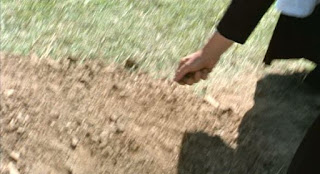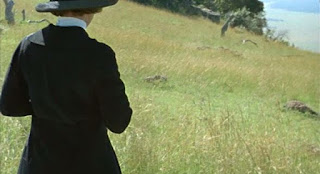It's the first line of the screenplay, and it will become a mantra throughout the movie, repeated and expanded the way Karen Blixen (under her pen-name Isak Dinesen) does in her book.
But, the "had" is an issue.
Blixen goes through many transitions throughout the movie, but the hardest one for her to learn is the one most imperialists need to address. She arrives in Africa from Denmark with wolfhounds and furnishings in tow and immediately tries to "civilize" her 1000 acres, making it a farm. That is her intent. She will make something of her plot of land and make it productive, because that is as it should be. That is the natural order of things.
Well, maybe in Denmark, but, as her lover Denys Finch Hatton points out, Africa was doing just fine without her. Finch Hatton was a free-ranger. He owned property, but after awhile he was barely there and sold it. He started out as a big-game hunter, but, over time, his safaris turned to photography, which he encouraged in his clients. In the film there is a running argument, where Finch Hatton tries to impart that, although she's bought property, Blixen does not really own her part of Africa. It is only when circumstances force her to abandon her farm, that she begins to come to the same conclusion. "The farm never belonged to me," she concludes. "I may have been wrong," he replies, maybe charitably.
Which is where director Sidney Pollack comes in, as he became aware while making it that the story was about possession and its viability in the wild spaces.
But, it's not just the land.
Possession comes down to relationships, too. Society formalizes it, ceremonializes it. One can always "put a ring on it," but, even the ring is not attached. We stay by choice. But, we don't "own" anybody, we don't possess them, putting a name to it like "love," not free spirits and not individuals.
We are alone, walking apart until we walk together, in sync.
That may be why this scene always produces tears for me (I was a wreck putting this together!) when Karen Blixen realizes—finally and concretely—that one can love (and love all they want, protest to the stars the depth of their affection). But one can never possess. One can never truly have.
That's why we close out February with this scene.
Action.
EXT/THE NGONG HILLS-DAY-VERY WIDE
At the gravesite Karen selected for herself. In the f.g., the three Kkuyu who've dug the grave now stand, move away as far in the b.g. a procession of cars and lorries edges up the hill, stops.
So far away we can't make them out, people debark; men take the coffin from the rear of a truck.
AOTHER ANGLE
Still QUITE WIDE. Delamere, other men we've seen before, lead the way with the coffin, struggling in the slippery knee-high grass. The minister, perhaps thirty other mourners, Bror and his wife among them.
And Karen, veiled, just behind the coffin. Her stride is steady. She carries a small book.
AT THE GRAVE-LATER
The coffin is in the ground. Karen nearest the grave, the others haphazard, spread out behind her. At distance, a few Africans.
THE MINISTER: "The sun shall not smite thee by day, nor the moon at night. The Lord shall preserve thee from all evil."
THE MINISTER: "He shall preserve thy..."
THE MINISTER: "...soul. The Lord shall preserve thy going out..."
THE MINISTER: "...and thy coming in."
THE MINISTER: "From this time forth and even forevermore."
ALL (ragged): Amen.
The minister steps back, looks at Karen. She removes her hat and veil, runs her fingers through her hair. For the first time we see her face: it's gaunt, beautiful.
Her voice will be low, steady and clear.
KAREN: "The time you won your town the race... we chaired you through the marketplace. Man and boy stood cheering by... as home we brought you, shoulder high."
PAN the mourners. Brave men swallow. Women are crying. Tears flow furiously from Bror's eyes; he will not wipe them. Delamere is trembling.
KAREN: "Smart lad, to slip betimes away..."
KAREN: "...from fields where glory does not stay. Early though the laurel grows... it withers quicker than a rose."
Felicity buries her face on her father's shoulder. Lady Macmillan's chin is very high. Lady Byrne turns away to stare up the hill.
And Wasili, alone at distance, watches.
KAREN: "Now you will not swell the rout... of lads that wore their honours out. Runners whom renown outran... and the name died... before the man."
ON KAREN
Not a tear. She no longer needs the book.
KAREN:
KAREN: "...will flock to gaze the strengthless dead..."
KAREN: "...and find unwithered on its curls..."
KAREN: "a garland..."
KAREN: "...briefer than a girl's."
Moment. Her voice steadies. She looks up at the hills.
KAREN: Now take back the soul of Denys George Finch Hatton...
KAREN: ...whom You have shared with us.
KAREN: He brought us joy... and we loved him well.
KAREN: He was not ours.
KAREN:(beat) He was not mine.
She bends to take a handful of earth to drop into the grave.
But she cannot drop the earth; the gesture is too final.
It trickles away through her hand.
She turns to the mourners, looks at them all..and seems to shrug.
She walks away, not towards the cars but down the slope of the hill.
At distance, Farah waits.
She pauses once, to take off her shoes. Far off, she passes by Farah, who turns to follow her down the hill.
Out of Africa
Words by Kurt Luedtke and A.E. Housman ("To an Athlete Dying Young")
Pictures by David Watkin and Sydney Pollack
Out of Africa is available on DVD and Blu-Ray from Universal Studios Home Entertainment.





























































































No comments:
Post a Comment